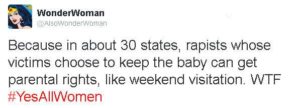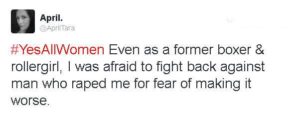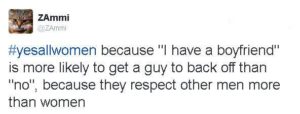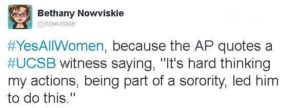It is a story we’ve heard before: a young person lashes out, innocent people die and society struggles to understand. It is a story we’ve heard so often it feels overwhelming, as if there is nothing a single individual can do to turn the tide of violence.
But this weekend, on the social media network called twitter, I and a few million of my female friends took a stand.













The latest bit of violence came at the hands of a young man, Elliot Rodger, who was (by all accounts) an incredibly troubled individual. He left behind several videos and written documents, which he dubbed his manifesto. What is immediately clear upon viewing any of these items is that Rodger both desperately wanted and hated women. In fact, I’d go so far as to say he felt entitled to women and their affections, and could not fathom why they did not worship at his feet.
“I am Elliot Rodger … Magnificent, glorious, supreme, eminent … Divine! I am the closest thing there is to a living god,” the 22-year-old California college student wrote.
He also wrote, “Women are like a plague. They don’t deserve to have any rights … Women are vicious, evil, barbaric animals, and they need to be treated as such.”
As news broke of Rodger’s killing spree, users on twitter gathered (as they typically do) to discuss the latest information coming out of California. As more of the vile documentation was brought to light, a conversation developed among the women, who wanted to express not only outrage about this particular violent episode, but bring awareness to the everyday things that all women feel compelled to do in order to stay safe. The sentiment was that while not all men perpetrate violence or are hostile toward women, all women incorporate things into their daily lives as protection against those who do.
A hashtag — a word, beginning with a pound sign, used to group conversations on twitter — was born: #YesAllWomen. Women began to share early Saturday evening and, as the comments resonated, more women spoke out.
As I began reading the comments, I was reminded of my column from early May, when I lamented the fact that women are often directly or indirectly blamed for being assaulted. At that time I wrote, “The blame and the shame needs to rest firmly on the shoulders of the individuals violating the law, and the realm of friendly advice needs updating to include our sons and brothers and husbands and friends.” This week, unfortunately, we have yet more evidence that I am right.
Throughout the years, I’ve been a part of several online conversations and awareness campaigns. While most shine brightly for a few hours, they often flicker and dim quickly. Whether it was because the #YesAllWomen discussions were truly organic — born of the frustrated and concerned people — or because they touched so many people, this particular set was a top trending topic on the network throughout Memorial Day weekend. For those unaware, in the twitterverse, that’s nearly a lifetime.
From walking through parking lots with our keys between our fingers, to wearing earbuds or headphones to drown out cat calls, to failing to report an assault for fear of being blamed, all of the women found common denominators. We learned that we’ve been watching out for one another for years — texting after dates or sharing safety tips. It’s all part of the larger realm of sisterhood that we have shared and are passing along to our daughters. For many of us, and for men aware of it, these things have become so common as to be an afterthought.
But even as we teach or daughters to be safe — which is a worthy pursuit — we must also take time to teach our sons that everyone deserves respect. It isn’t only that the woman you’re harassing is someone’s daughter or mother or sister. The point is: she is someone.
This column by Lynda Waddington originally published in The Gazette on May 27, 2014.
